“All Alone on Kangaroo Island” was the title of the talk assigned to me for #smaccUS in Chicago. Speakers don’t get to choose the title of their talk – instead Chris Nickson (@precordialthump) assigns a topic…usually in line with expertise.
It was tempting to talk to my favourite subjects – those into which I’ve devoted a lot of effort over the past 3 years. My focus has been centred around the fact that ‘critical illness doesn’t respect geography’ and the possibilities of FOAMed to help deliver ‘quality care, out there’. Previous talks have been on this sort of stuff ie rural prehospital care, use of checklists in airway management and rural resus room planning.
The brief to speakers was to provide a thoughtful and inspiring talk – not the usual ‘death by powerpoint’ lectures. As an added incentive, all speakers received a copy of ‘Talk like TED” some 6 months before the conference and were instructed to give a memorable talk.
“Everyone loves tales of medical Macygyverism & bush medicine.
But then again, maybe not. Life-&-death procedures are discussed endlessly online. Perhaps it was time for something different….“
As a rural clinician at a conference of (mostly) hardcore emergency, critical care & prehospital colleagues, I thought that giving a talk on the usual stalwarts of dealing with critical illness in the bush would be adequate (emergency airway management, head injury where no CT, major haemorrhage).
As clinicians we often talk about medical heroics – everyone wants to hear about the resuscitative thoracotomy…or the surgical airway….or how to perform a Burr hole. And yet these are (for most of us) once in a career procedures. Maybe there was something else relevant to this audience of emergency and critical care clinicians – something more common, but which we are generally reluctant to discuss…
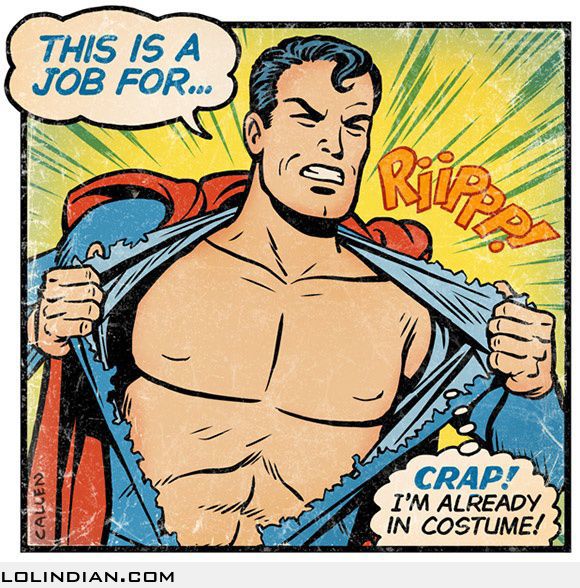
After some soul-searching, I decided to play upon the title “All alone …” and talk about personal and professional isolation….about depression…the spectre of substance use disorder…of burnout….and of emotional resilience – all tied together by personal experiences of vulnerability as a clinician.
“Make no mistake – the true heroes in any medical tale are our patients”
Watching Brian Goldman’s excellent TED talk “Doctors Make Mistakes – Can We Talk About That” was the inspiration for my talk. Being involved in a medical error, whether caused by personal omission or systems factors, is devastating for all involved. Clearly the patient is the victim in such circumstances – but the clinician may also be affected (so-called second victim phenomenon).
I exchanged emails about this with StEmlyn’s Simon Carley before the smaccUS conference and found we were both going to touch on aspects of the second victim phenomenon. I also knew others would be talking about failure and loss in medicine, as a counterpoint to the hardcore critical care – thus ‘mixing it up’ for smaccUS and challenging the audience and ourselves.
Of course it’s not just medical error – the reality is that all clinicians have their share of stressors, including administrative frustrations, juggling work-life balance or the mismatch of our own (often extremely high) expectations and reality. When things don’t go to plan, compassionate clinicians experience difficulty….and this makes us feel vulnerable.
Brene Brown is a renowned TEDx speaker on the topic of vulnerability. Listening to her talks, I saw the importance of the emotions of shame and guilt which being vulnerable engenders…and I realised that this message was entirely appropriate to critical care clinicians.
Vulnerability is an inevitable result of error, frustration, burnout, mismatch of expectation and reality. It can give rise to emotions such as shame and guilt….and although being vulnerable poses dangers for clinicians (shame can induce depression, burnout, substance abuse), it can also spur us into making things better.
Embracing the use of FOAMed for rapid knowledge-translation has improved both my own knowledge base and the systems of care in which I work. Similarly the connectivity with like-minded FOAMed clinicians has helped debrief and frame actions after difficulty. At the heart of this is the sense of community and connectivity, encompassing empathy and need for quality & authenticity, borne from that lonely place of vulnerability. Truly, in this connected world there is no longer a reason to be “all alone” whether professionally or socially.
Preparation & delivery?
I went back to basics to make my smacc talk worthy of the audience. UK Paediatric Surgeon Ross Fisher (aka @ffolliet) has been a mentor and online inspiration to me since 1998 from the Doctors.Net.UK fora – he now blogs on presentation technique at P3 presentation skills – and I wanted to give a talk that would make him proud. I also remembered a tip from presentation guru Garr Reynolds on the need to give a ‘naked presentation‘ (by which he meant minimise use of text, don’t hide behind podium & communicate openly and honestly).
I may however have gotten this muddled with an amusing post on LITFL regarding Prof Giles Brindley “How to Give An Unforgettable Talk” – an infamous presentation where the good Professor made a live demo of penile injection for erectile dysfunction in front of a horrified crowd of urologists and their unsuspecting partners…
Out of these seeds germinated an idea…I was planning to talk about vulnerability – so why not use body as metaphor and expose my own vulnerability by stripping down to expose my ‘vulnerables’ in front of an audience of strangers. Add to this my previous fear of public speaking, and the conditions were set for a perfect storm…
“Travel to Chicago and get naked with a bunch of people you’ve only met on the internet – yep, the smacc conference is like no other”
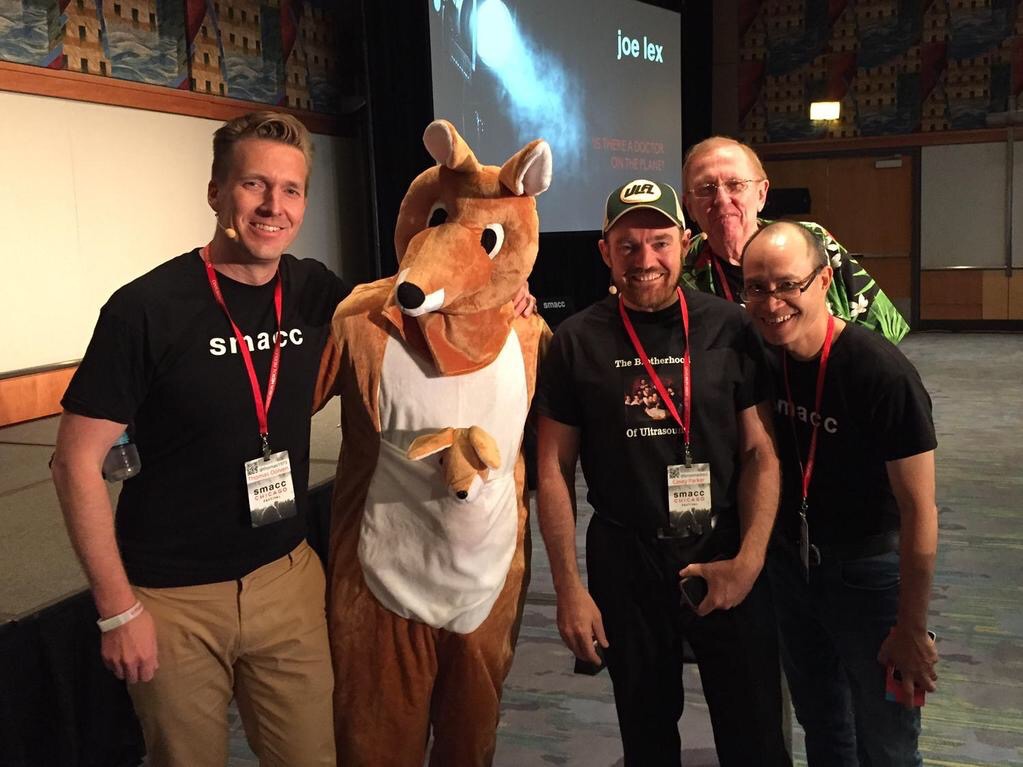
A pre-smacc draft of my talk is accessible below. The final version was somewhat shorter, punchier…and involved me getting my kit off.
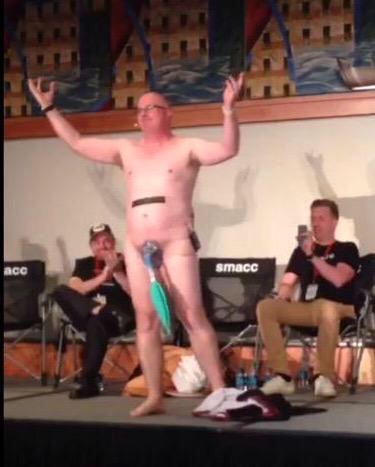
“Sadly many people will only remember the nudity. The real message is that we are ALL vulnerable as clinicians, from a variety of stressors…”
https://vimeo.com/130819016
The main messages of my talk were :
- have the courage to expose your own vulnerability (it’s uncomfortable, but can be the birthplace of drivers to do ‘better’)
- be kind to each other (interspecialty or craft group bitching is all too easy – but ultimately fruitless. We’re ll doing our best to care for patients, and it’s all too easy to criticise from a tertiary ivory tower without an appreciation of difficulties faced)
- with FOAMed, you are no longer alone as a clinician (distributive Web 20 technology gives both rapid knowledge translation and a clinical community)
Of course there are several intertwined messages here and educationalists will recognise use of the von Restorff effect and emotional activation in many smacc talks.
The final message related to the risks of burnout and mental illness amongst clinicians. I would consider it a win if audience felt enabled either to put their hand up & ask for help if they were suffering in the future….or to put their hand up and help their colleagues if they were concerned.
On that last point, I started my talk by asking how many people had been involved in a variety of gnarly procedures – and as expected a fair number of hands went up. When I asked about depression…just one! The stats belie that – between 1:3 to 1:4 clinicians will experience a major depressive episode in the career…and about 1/12 will consider suicide. But we are reluctant to acknowledge this.
After the talk was over, it was gratifying to receive a veritable deluge of face-to-face thanks from conference attendees… and I continue to receive many messages via email or personal messaging from clinicians now empowered to share their stories. And these messages keep rolling in – from students, trainees, post-Fellowship specialists and from some established senior clinicians considered international experts.
It seems I struck a nerve – and on that basis, this #smaccTALK was a success. I now feel like a GP to the #FOAMed and #smacc community – truly humbling…
Thanks #smaccfamily
Show notes for “All Alone on Kangaroo Island”
How to Give An Unforgettable Talk – the infamous Brindley Lecture explained, from LITFL
Naked Presentation – Garr Reynolds from Presentation Zen (PDF here)
P3 Presentations – from Ross Fisher aka @ffolliet
The Science of Happiness – brilliant presentation from Tony Fernando on mindfulness for clinicians
Responding to the Needs of Distressed Doctors – excellent talk from Michael Kaufman on the myth of clinician invincibility (superman/superwoman)
The Vulnerable Physician – insightful talk from Michael Kaufman on substance abuse disorder in doctors, a topic applicable to all clinical craft groups
Responding to Adverse Events – a consensus of Harvard hospitals on responding to clinical error
Klotz L. How (not) to communicate new scientific information: a memoir of the famous Brindley lecture. BJU Int. 2005 Nov;96(7):956-7. PMID: 16225508. [free fulltext]
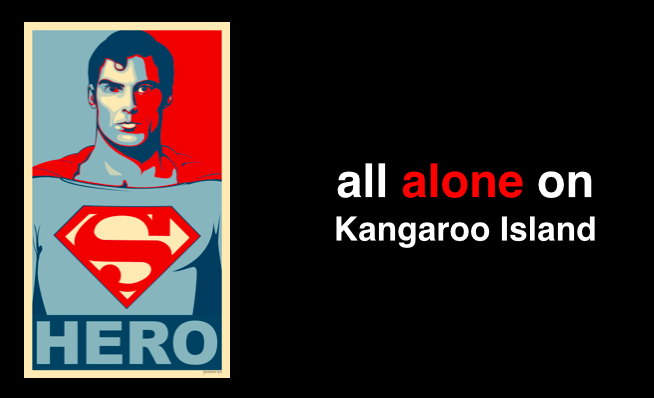
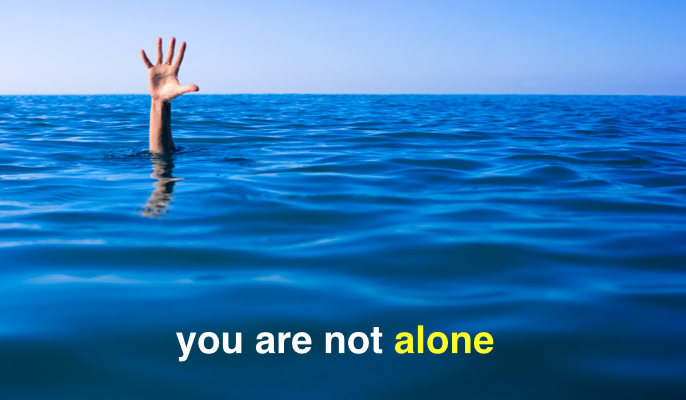
Tim, you are an incredible man, a humbling and humble inspiration. Thank you for sharing yourself and your insights.
Pingback: What Makes a Good Conference? - KI Doc